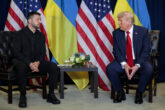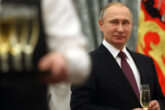November 09, 2018
The United States' Greatest Strength Over Russia and China is Its Alliance with Europe
President Donald Trump has rightly recognized that America must do more to stand up to Chinese and Russian threats to U.S. interests. While most agree that having a national security strategy centered around strategic competition is wise and warranted, the administration is falling short in how it is executing that strategy. If the United States wants to retain our competitive edge over our rivals, this administration must embrace and strengthen our greatest assets: our vast network of alliances and commitment to democracy. As Trump heads to Paris this weekend to mark the 100th anniversary of the end of World War I, therefore, he would do well to recognize that supporting strong European allies and transatlantic cohesion will be the best way to counter rising Chinese and Russian influence.
So far, Trump has treated our European allies not as a strength to be developed, but as a problem to be corrected. Actions he views as reasserting American power—levying tariffs, insulting European leaders and labeling the European Union a “foe”—are ironically, hastening its decline. By straining our relationships, Trump is weakening America’s capacity to deter Russia and compete with China. The United States’ withdrawal from the Intermediate-Range Nuclear Forces (INF) Treaty, the Paris Climate Accords and the Joint Comprehensive Plan of Action, widely known as Iran nuclear deal, have repeatedly left Europe and the United States on opposing sides. Trump is operating from an assumption that he can bully our allies into correcting imbalances in our relationships and that our bonds will not suffer. In an era of strategic competition, operating under these assumptions is wrong and dangerous.
Trump’s upcoming trip to Europe provides the president with an opportunity to correct his course. Building strong alliances and partnerships in Europe should be at the heart of any competitive strategy with China and Russia. By 2032 China’s economy will surpass that of the United States. It is also building military capacity that, very soon, will be on par with that of the United States. As China rises, states have two options: they can bond together to balance this growing power, knowing that their collective might and influence are sufficient to contain the rising threat, or they can bandwagon with the hope that by aligning with China they can avoid attack and share the spoils of geopolitical victory. History shows that balancing by coming together with others and forming strong alliances is the best way to avoid becoming a victim. This raises the imperative that Trump ensure continued alignment with Europe in order to balance China’s growing power.
Read the full article in The National Interest.
More from CNAS
-
What’s Driving President Trump’s New Confidence in Ukraine’s War Effort
President Trump dramatically declared on social media that he now believes that Ukraine can reclaim all its land from Russia, which he described as a paper tiger. From the Ova...
By Richard Fontaine
-
‘The U.S. Has Got to Get Involved’: Townsend on NATO Boosting Polish Air Defences
Jim Townsend, adjunct senior fellow at the Center for a New American Security, discusses what actions NATO countries need to take amidst Russia’s incursions of NATO airspace.W...
By Jim Townsend
-
Defense / Transatlantic Security
Europe’s Delusions Over What It Means to Deter RussiaToday’s European leaders are in a Singapore trap, crafting a training mission designed to signal resolve rather than achieve an actual military objective....
By Franz-Stefan Gady
-
The Wrong Way to Do Diplomacy With Russia
In fact, the summit helped Putin legitimize Moscow’s grievances, giving Russians who might doubt the wisdom of the invasion reason believe that it was, as Putin promised, just...
By Celeste Wallander




